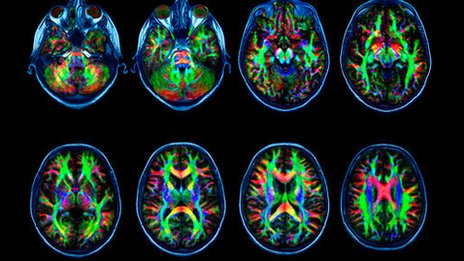In the bustling realm of social media, TikTok has emerged as a formidable force, captivating the attention of millions with its short-form videos and addictive algorithms. While the platform offers a platform for creativity and entertainment, it also harbors a darker side, one that threatens to subtly reshape the human brain and its cognitive functions.
A Dopamine Rush for the Brain: Rewiring the Reward System
At the heart of TikTok’s allure lies its ability to trigger an almost Pavlovian response in users’ brains. Each captivating video, each carefully curated algorithm-generated feed, releases a surge of dopamine, the neurotransmitter associated with pleasure and reward. This dopamine rush, akin to that experienced from addictive substances, reinforces the urge to continue scrolling, consuming more and more content.

Photo taken from the BBC.
The constant barrage of dopamine hits on TikTok has a profound effect on the brain’s reward system. Over time, the brain becomes accustomed to this level of stimulation, making it increasingly difficult to find satisfaction in activities that do not provide the same level of dopamine release. This can lead to a decline in attention for tasks that require sustained focus, such as reading, studying, or engaging in deep conversations.
Studies have shed light on this phenomenon. One research conducted by the ‘journal Addiction’ found that heavy TikTok users exhibited elevated levels of dopamine activity compared to non-users. This elevated dopamine response, akin to that experienced from addictive substances, is a key factor in TikTok’s addictive potential.
Memory’s Fragile Tapestry: Disrupting Information Processing
The sheer volume of content consumed on TikTok also wreaks havoc on memory formation and consolidation. The brain’s ability to process and store information effectively is disrupted by the constant barrage of fleeting stimuli. This can lead to a decline in short-term memory, making it harder to retain information over a longer period. A study published in the journal ‘Nature Human Behaviour’ corroborates this finding, demonstrating that TikTok users exhibited shorter attention spans than non-users.
Moreover, the emphasis on novelty and entertainment on TikTok often comes at the expense of depth and meaning. The platform’s algorithm favors content that is attention-grabbing but lacks substance, hindering the brain’s ability to form meaningful connections and engage in deep learning. This can lead to a decline in critical thinking skills, making it harder to analyze information and make sound judgments.
Mental Well-being Under Siege: The Toll on Emotional Health
The impact of TikTok on the human brain extends beyond attention and memory, reaching into the realm of mental health. The constant comparison with others’ seemingly perfect lives and the pressure to curate one’s own online persona can lead to feelings of inadequacy, anxiety, and depression.
The curated nature of TikTok content can foster unrealistic expectations and fuel feelings of inadequacy. Users are constantly bombarded with images of others who appear to have perfect lives, leading to a distorted perception of reality and a sense of inferiority.
The pressure to maintain a carefully crafted online persona can also take a toll on mental health. Users may feel compelled to constantly create and share content that meets the expectations of others, leading to feelings of stress and anxiety. This can also hinder the development of genuine self-acceptance and self-esteem.
A study published in the journal ‘Cyberpsychology, Behavior, and Social Networking’ highlights this connection, demonstrating that TikTok users exhibited higher levels of anxiety and depression compared to non-users. Additionally, they were more likely to experience body image issues due to the unrealistic portrayal of beauty standards on the app.
A Call for Mindful Consumption: Reclaiming Control
In the face of these insidious effects, it is crucial for TikTok users to approach the platform with caution and mindfulness. Limiting screen time, engaging in alternative activities that promote cognitive health, and fostering real-world social connections can help mitigate the negative impacts of the app.
Limiting Screen Time: Breaking the Cycle
Reducing screen time is a crucial step in reclaiming control over one’s relationship with TikTok. Setting daily limits on app usage and establishing tech-free zones, such as bedrooms and dining areas, can help break the cycle of addiction and promote healthier habits.
Alternative Activities: Nurturing the Brain
Engaging in activities that promote cognitive health can also help counteract the negative effects of TikTok. Reading, studying, playing brain games, and engaging in creative pursuits can all help strengthen neural connections and improve memory and attention.
Real-world Connections: Fostering Genuine Relationships
Prioritizing real-world interactions and fostering genuine social connections is essential for maintaining emotional well-being. Spending time with friends and family, engaging in hobbies, and participating in community activities can provide a sense of belonging and reduce the reliance on TikTok for social validation.
Cultivating a Critical Eye: Recognizing the Curated Reality
Developing a critical eye towards the content presented on TikTok is essential. Recognizing the carefully curated nature of online personas and the potential for misinformation can help prevent unrealistic comparisons and protect mental well-being.
It is important to remember that the lives portrayed on TikTok are often carefully crafted and may not reflect reality. Users should be mindful of this and avoid making direct comparisons to their own lives. Additionally, they should be critical of the information they consume on TikTok and cross-check it with reliable sources.
Conclusion: A Balancing Act
TikTok offers a platform for creativity and entertainment, but its impact on the human brain cannot be overlooked. The app’s relentless pursuit of attention, its disruption of memory formation, and its potential harm to mental health raise concerns about its long-term effects.
It is imperative for users to approach the platform with caution, prioritizing mindful consumption and cultivating a healthy relationship with technology. By limiting screen time, engaging in alternative activities that promote cognitive health, fostering real-world social connections, and developing a critical eye towards the content they consume, users can mitigate the negative effects of TikTok and maintain control over their digital lives.
Ultimately, the key lies in striking a balance between enjoying the entertainment that TikTok offers and protecting the well-being of the human brain. By being mindful of the app’s influence and taking steps to safeguard their cognitive and emotional health, users can harness the positive aspects of TikTok while avoiding its insidious effects.




